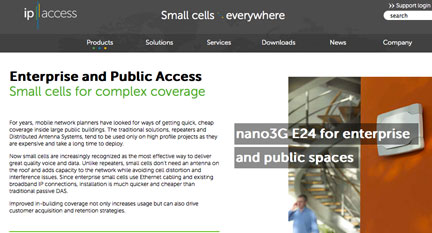
VT iDirect, Inc. (iDirect), a company of VT Systems, Inc. (VT Systems) has successfully completed pilot tests with ip.access Ltd. to support 3G service over ip.access’ nano3G® small cell device and iDirect’s Evolution® X1 Outdoor satellite remote. The pilot simulated a live network that could support data rates of 10 Mbps on the outbound channel, 1.2 Mbps on the inbound channel and up to 24 simultaneous voice calls. The tests validated that mobile operators can affordably expand 3G services into remote or new areas, delivering broadband data rates and carrier-class voice quality using small cell technology. iDirect is a world leader in satellite-based IP communications technology.
The pilot addressed two persistent challenges for mobile operators—how to extend voice and data services to remote areas, where traditional macro cell towers are either too costly or simply not possible to install, and how to affordably backhaul mobile traffic. The pilot featured a nano3G small cell device from ip.access, a leading small cell solutions vendor for mobile operators around the world.

The nano3G is a low-power wireless access point that provides hot-spot-like 3G coverage in a public area, private home or business. Small cell devices are a cost-effective alternative to macro cell deployments. They offer significantly lower cost points in purchase and backhaul and can be deployed quickly, with greatly reduced need for technical expertise.
To learn more about small cells and satellite connectivity, visit iDirect at the Mobile World Congress in Barcelona, February 25-28. iDirect personnel and equipment will be present in the small cell zone, stand 7G74, Hall 7.
The test also featured iDirect’s Evolution X1 Outdoor satellite remote, which works in tandem with small cell devices to backhaul data from remote locations to the core network. Modern TDMA-based satellite systems deliver carrier-class, two-way, all-IP connectivity and can share bandwidth efficiently across multiple end user sites.
Further, satellite backhaul has advantages over competing technologies in being quicker and more convenient to deploy and often more economical when extending service into territories that are otherwise difficult to reach.
The proof of concept highlights the opportunity for mobile operators to cost-effectively expand 3G and even 4G connectivity to underserved areas and markets. It’s a critical business opportunity as smartphone adoption and data subscription plans are growing exponentially worldwide. Cisco predicts that mobile data traffic will increase 18-fold worldwide by 2016, compared to 2011 rates. And the number of mobile connected devices will surpass 10 billion.
"This joint test is an important validation that mobile operators can leverage small cell devices and satellite backhaul to cost effectively expand 3G service into new areas. This initiative builds on more than four years of successful 2G ip.access deployments in fixed rural and mobile environments using iDirect satellite backhaul. We can now enable mobile operators to capitalize on the global surge in demand for smartphone service.” Gavin Ray, VP Product and Marketing, ip.access
"Together, small cell technology and satellite communications are dramatically changing the economics of remote connectivity. Companies like ip.access are opening a gateway for mobile operators to capture millions of new subscribers and achieve significant profitable growth, while bringing high-speed connectivity to underserved populations and business markets.” Richard Deasington, Director, Market Development, iDirect.
iDirect’s mobile industry expert, Richard Deasington, will be presenting on Monday, February 25 at 3:30pm at the small cell zone at the Mobile World Congress in Barcelona, Spain.

